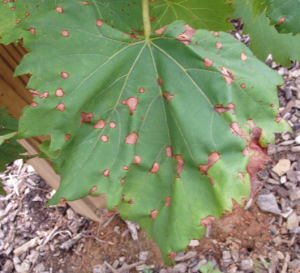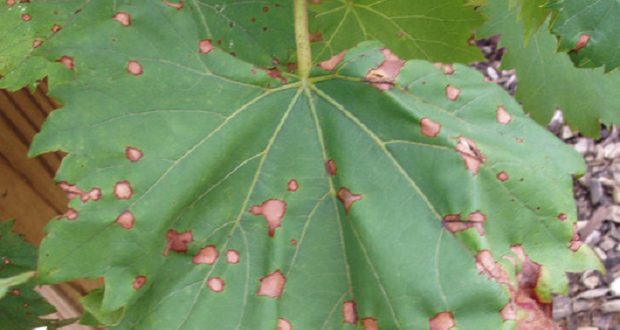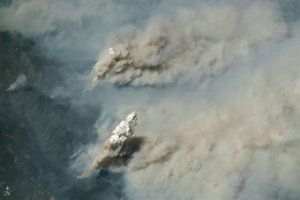By Brian David —
We know that wildfire smoke affects people’s health. Particles of burned plants and trees land on dust particles and are breathed into the lungs. However, this year’s Ferguson Fire not only affected you, it affected your plants.
This summer’s Sierra foothill smoke has limited gardening, in part by imposing health restrictions on gardeners. In areas that were evacuated, it meant plants went without care outside of the kind acts of conscientious fire fighters. Power outages, which often accompany wildfires, often result in irregular watering.
Plants, like people, need clean air for optimal health. The effects of smoke on plants can be tasted in fruits like grapes — wines produced from grapes developing during a wildfire will often have a smoky taste. Air pollution’s effects on plants have been documented in California since the 1940s. Air pollution decreases crop production and impacts the financial return on commercially grown produce. A combination of particulate matter and the low-lying ozone (O3), created by burning fossil fuels, can reduce yields of plants and trees by twenty percent.
Wildfire smoke may slow the development of garden plants, or leave plants with signs of stress on their leaves. You may have smoke-stressed plants if you find:
- leaves loosing their green color (chlorosis)
- leaf cell injury or death in the leaf (necrosis)
- irregular small dark spots on the leaves (stipples)
Brown, bronze or red sections on the leaf may also be the result of the plant’s pores (stoma) being overloaded with particles and ozone from the smoke.
 Wildfires often require sprayed fire retardants to slow a fire. Long Term Fire Retardant (LTFR), the pink spray, is often composed of phosphates, sulfates, nitrogen and water. These elements suffocate the fire and fertilize the forest. The LTFR’s also alter the natural forest growth and wash into water ways increasing aquatic plant growth, which impacts aquatic animal development and survival.
Wildfires often require sprayed fire retardants to slow a fire. Long Term Fire Retardant (LTFR), the pink spray, is often composed of phosphates, sulfates, nitrogen and water. These elements suffocate the fire and fertilize the forest. The LTFR’s also alter the natural forest growth and wash into water ways increasing aquatic plant growth, which impacts aquatic animal development and survival.
But the best thing we can do for an environment with poor air quality is to grow more herbaceous plants.
Fall gardening in the Mother Lode can be like discovering green gold. Now is the time to prepare for your garden’s bright future. Soon rains will fall. The air will be clear blue and the land will revive. Planting our fall crops before the rains arrive allows their roots to drive deep into the soil maximizing fall and winter watering for vibrant foliage.
Consider planting nutrient dense vegetables like broccoli, brussel sprout, cabbage, cauliflower, collard, radish, kale and mustard greens. You may need row covers to protect from moth worms. Other great vegetables like lettuce, beet and carrot seed can all go in now.
Flowers like calendulas, primrose, snap dragons and pansies will color your fall garden. Spring maturing bulbs like narcissus, daffodils and brodiaea can go in now and do not need watering. This month plant for cleansing rains and happy holidays.
Brian David is a U.C. Master Gardener, Mariposa
More information on this topic is available from:
USEPA, “Particulate Matter” USDA, “Where There’s Fire, There’ Smoke and It’s Bad For Your Health” California Agriculture, Vol 48, #4, David Grantz NSA Photo, “Ferguson Fire” UCANR Photo, “Smoke Affected Plants”
If you are interested in learning more about gardening topics such as these, consider applying for the bi-annual UC Master Gardener course, which runs from January 09 – May 08, 2019. Classes are on Wednesdays from 9 a.m. to 1 p.m. at the Cathey’s Valley Park. Pick up applications at our booth at the Mariposa County Fair, Farmer’s Market, any UC Master Gardener event, the Cooperative Extension Office, or by email at smace@ucanr.edu.
Visit our UCMG website : http://cemariposa.ucanr.edu/Master_Gardener
Follow us on Facebook at: https://www.facebook.com/mariposamastergardeners
Listen to local interviews : KRYZ, 98.5 FM at, http://www.kryzradio.org
The U.C. Master Gardener Helpline is staffed Thursdays from 2 – 5 p.m. Please contact the helpline, or leave a message by phone at: (209) 966-7078 or by email (send photos and questions for researched answers) to: mgmariposa@ucdavis.edu
Master Gardener Office Location:
UC Cooperative Extension Office,
5009 Fairgrounds Road
Mariposa, CA 95338
Phone: (209) 966-2417
Email: mgmariposa@ucdavis.edu
Website: http://cemariposa.ucanr.edu/Master_Gardener/





